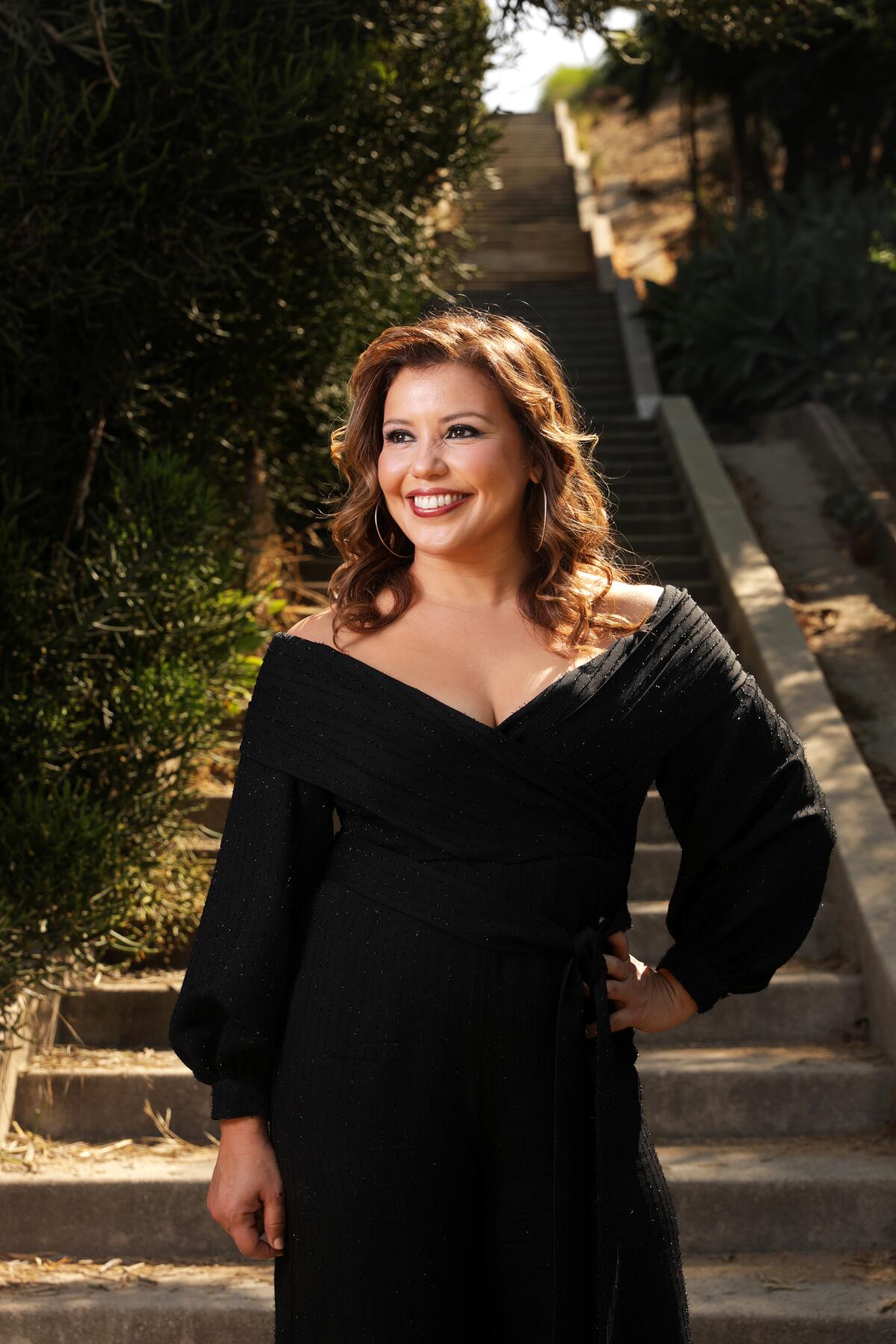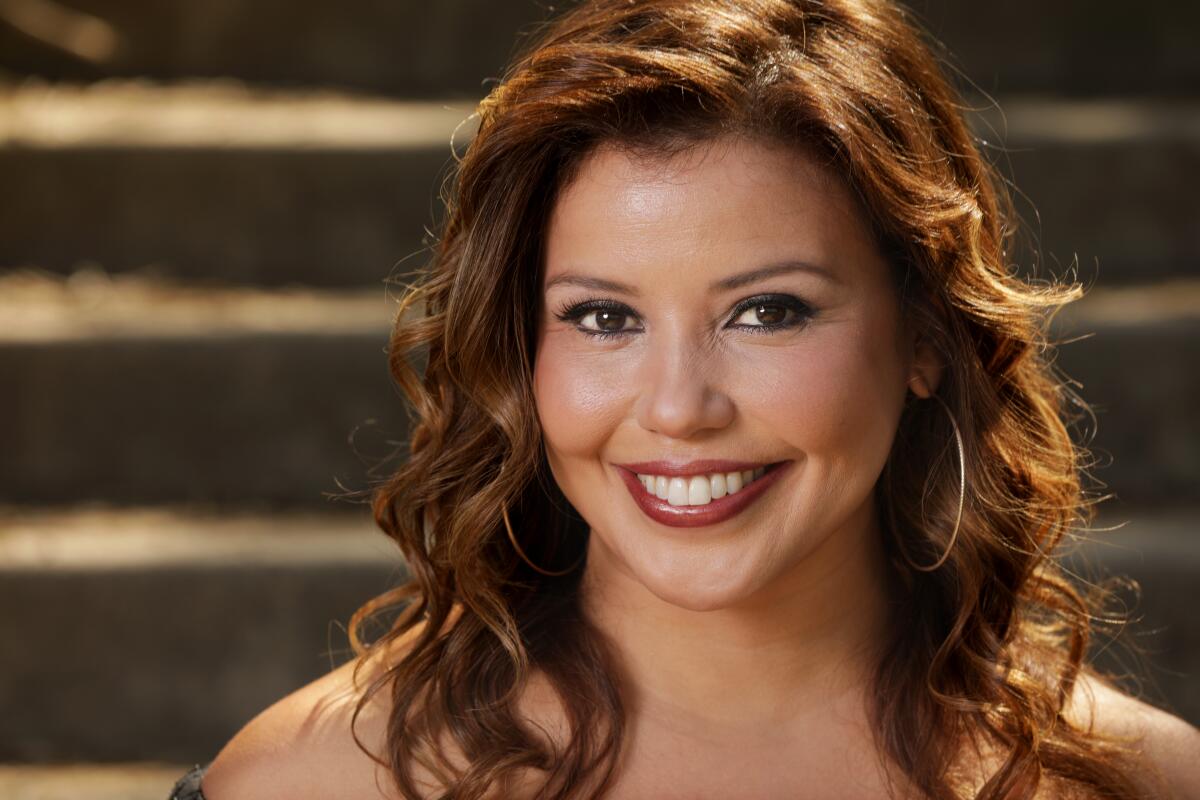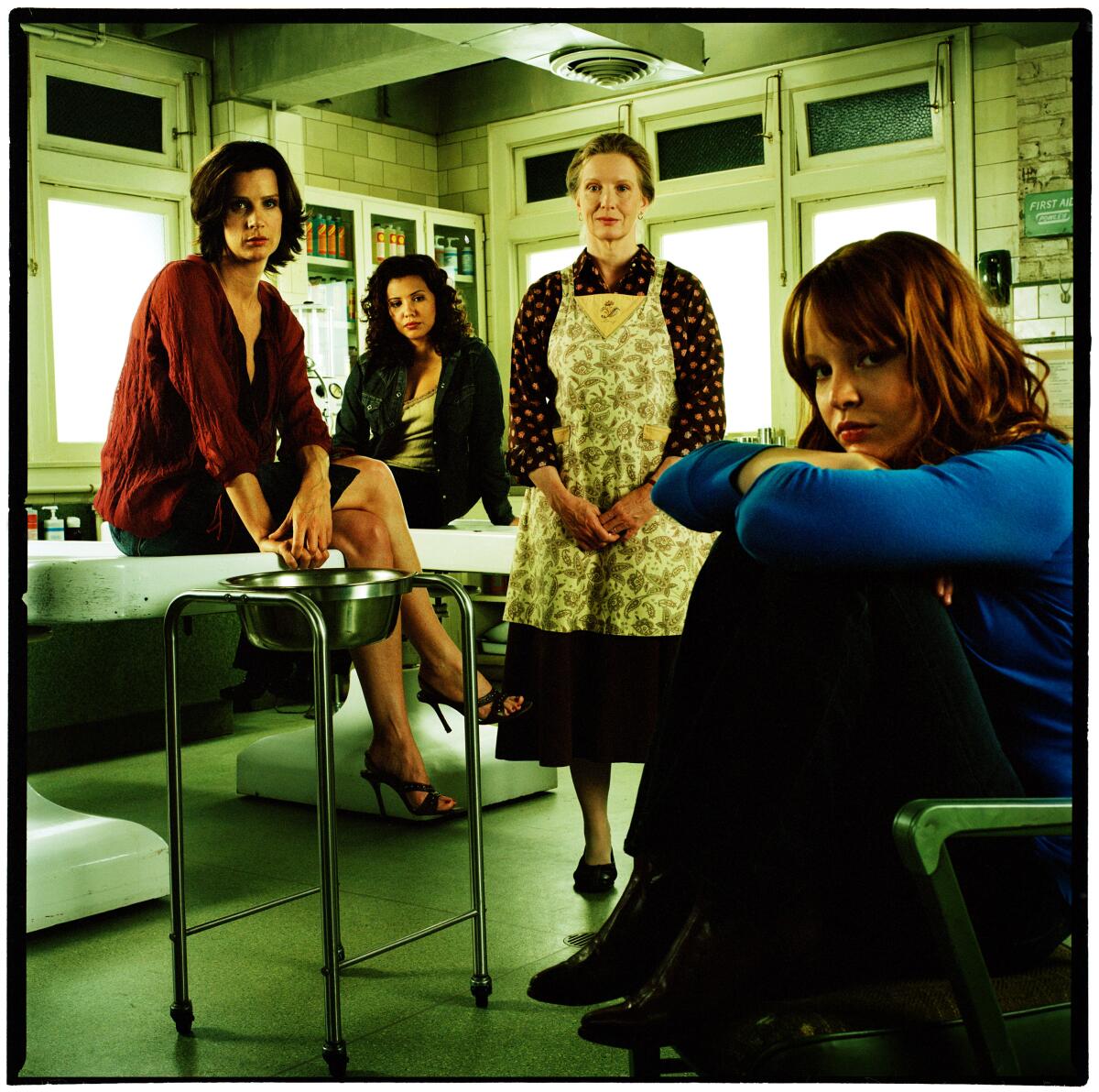Broadcast TV is ready for a Latino family. Justina Machado is here to prove it

- Share via
Justina Machado has never felt this exhausted. It’s late September, just a few hours before she heads off to another three-hour rehearsal for “Dancing With the Stars,” and the actress is at her home in Silver Lake fueling up on lunch when she reveals the unusual piece of equipment that has been a life saver — or rather, a feet saver — since joining the current season of the prime-time dance boot camp.
“I literally have this big caldero that you make arroz con gandules in,” she says, referring to the Puerto Rican rice dish. “I can’t even make any arroz con gandules in there anymore because it has become the pot for my feet. Gross, right? Every day when I come home, my routine is dunking my feet in there with ice. The first week and a half of rehearsals, forget about it — I was crying. I was like, ‘Oh, what did I do?’ Everything hurts me, why did I do this?’”
So, why did she do it?
For one, it was a much-needed quarantine distraction for the “One Day at a Time” star that required neither the patience of making sourdough bread nor the quirkiness common to viral sensations. “It sounded exciting, the idea of learning things I’ve never done before,” says Machado, 48. “Like a lot of people right now, I was feeling very depressed, and there’s so many things happening in the world and so many things we wish we could do and can’t — this couldn’t have come at a better time. And I love old Hollywood — love, love, love old movies and old musicals. And I’m always like, ‘Oh, I wish I was acting in that time.’ But if I was, I’d be playing Lupe the house maid. I wouldn’t be dancing with Fred Astaire.”
“One Day at a Time” survived cancelation at Netflix and the move to Pop. Now, as Season 4 debuts, the coronavirus outbreak has thrown it another curveball.
That gets at the other reason: visibility.
“The thing about ‘Dancing With the Stars’ is it reaches so many more homes than my incredible show [‘One Day at a Time’], that should reach everybody’s home. I know they’ve had Latinas on the show, but they need a whole lot more. And so I was like, ‘I’m going to do that. I’m going to be that Puerto Rican woman that’s on that show.’”
Make that two shows: On Oct. 12, the pandemic-halted fourth season of Machado’s sitcom begins a three-week run on CBS, in the Monday time slot immediately following ABC’s “Dancing With the Stars.”
For the actress, who plays single mom and military veteran Penelope Alvarez on “One Day at a Time,” the broadcast spotlight is long overdue: Her career has never quite positioned her front and center, despite strong supporting turns on “Six Feet Under,” “ER,” “Queen of the South” and “Jane the Virgin.”
Speaking over video conference, Machado convincingly masks any aches and pains she may be feeling with her usual vibrant energy. Her distinctive laugh still bounces through a room even over a Wi-Fi connection— just as it does when she recalls the “Dancing With the Stars” cameras catching her scanning her phone during the live show as a ping-ping-ping of encouraging texts arrived on the “One Day at a Time” group thread.
ABC’s ballroom competition “Dancing With the Stars” has always embraced reality TV celebs to stay “relevant.” This season takes it to another level.
In a perfect storm of exposure, her strong showing on “Dancing With the Stars” so far should help bring attention to the comedy’s broadcast debut, which will likely play a role in the series’ chances for a fifth season. Its survival has deep, personal resonance for Machado, who has long been vocal about Hollywood’s shortcomings when it comes to Latino representation.
Originally set up at Netflix, the Latino-fronted reboot of Norman Lear’s classic sitcom was canceled in 2019 after three seasons. Sony Pictures Television, the studio that produces the series, shopped the comedy to other networks, eventually landing the Cuban American family sitcom at Pop TV, which gained fame with cult favorite “Schitt’s Creek.”
Its run on CBS, which was the home to the original series, is part of the deal ViacomCBS sister network Pop TV made in rescuing the series. It is the only series with a Latino family airing on broadcast television this season.
“I always believed that this show belongs on a network,” Machado says. “I love streaming. People love to stream. I understand that’s the thing, but in reality, network just reaches more households. ... We only have three weeks, but that’s OK. I just want people to watch it, because if they watch it, we’ll get that fifth season.”
And that means we’d get more Penelope Alvarez. The role has provided Machado an opportunity to reveal dimensions atypical in a traditional sitcom. Penelope is a hard-working single mom dealing with the complexities of raising two teenage children, while also caring for her strong-willed mother, played by screen legend Rita Moreno.
Over the show’s four seasons, viewers have watched Penelope, previously a medic in Afghanistan, struggle with depression and anxiety — addressing a subject that has often been taboo within the Latino community. They’ve watched her grapple with her Catholic upbringing as she processed her daughter’s sexuality with honesty and openness. They’ve watched her go back to school to become a nurse practitioner. And they’ve watched her try to fit romance into her jam-packed life.
“She’s the best,” says Machado, who had been slated to make her directorial debut on the series before the COVID-19 pandemic thwarted those plans. “This is why it’s so important when women are in the writers room. So many times, you see these sitcoms, and the mom is just a throwaway character and the dad gets all the jokes and the mom looks like she’s been shopping at JCPenney. It’s like, all of a sudden you turn 40 and you can’t be cute anymore? I don’t get it. And that even if you’re a mom, you’re still a woman.”

Gloria Calderón Kellett, who serves as co-showrunner of the series alongside Mike Royce, praised the texture and nuance Machado brings to the character: “I don’t think people get how difficult it is to play multi-camera grounded. She’s real and raw. She’s emotional, she’s funny, she’s silly, she does physical comedy. The woman can truly do it all.” Machado’s range is something Calderón Kellett took notice of back when she too was navigating the acting scene.
“Back in my acting days, I would always lose parts to this Justina Machado person,” Calderón Kellett says by phone. “It became a joke. If I saw that she was on the sign-in sheet, I would just leave. And then I started watching her work and I understood why. She’s brilliant. I was a fan. Every time she showed up in something, it really did feel like: ‘This is somebody who represents me; this is the first time I am seeing myself on TV’ — through Justina.”
She gets high praise too from costar Moreno, whose career helped blaze a trail for Latino actors in Hollywood.
“She is one of the best people I’ve worked with in my life — bar none,” says Moreno, who affectionately refers to Machado as “nena” (sweetie). “She moves me. She makes me laugh. And she’s a terrific scene partner, because we have great chemistry and an enormous respect for each other. There’s something about her that is so true as an actress. And you can’t buy that.”
Still, it’s not lost on Machado that she’s trying to prove television viewers will watch a show that revolves around a Latino family roughly two decades after a network executive suggested they wouldn’t. Machado was cast as the lead in the late ’90s comedy pilot “I Love Lupe,” which featured a Latino family. When the series wasn’t picked up, Machado, who was in her early 20s, received a call from the executive to explain why: “He literally called my house, nice man... and said, ‘My God, your pilot is so great. Everybody loves you, everybody. But we don’t think America is ready for a Latino family.’
“That was acceptable for him to say — ‘America’s not ready for [a] Latino family.’ Like, what? And that was the ’90s! And look at today. How many Latino families do you see on television? So America better get ready because we’re here. We’re here.”
Born and raised in Chicago to Puerto Rican parents, Machado was always “making up scenarios” and roles to act out with her siblings but never imagined it could actually happen. On a recent episode of “Dancing With the Stars,” the actress shared a letter she found during a trip back home in which she, as a 5-year-old, expressed her desire to be a performer. But it wasn’t until her time in the Latino Chicago Theater Company that she gained the confidence to see herself as an actress and decided to make a career out of it.

“It’s where I found my tribe,” she says. “Juan Ramirez, one of my mentors, lifted me up. I remember that it was maybe the second or third play and he was like, ‘Do you think you’re an actress now?’ Because I kept saying, ‘I’m not an actress. I’m just doing this because I don’t have anything to do.’ That’s all I would say. Because nobody was an actor in Chicago that I knew, in my neighborhood, in the inner city of Chicago. That wasn’t a part of my world.”
Her first credit is a 1993 episode of “ABC Afterschool Specials,” playing a 16-year-old girl with an abusive boyfriend. Over the next 25 years, she worked steadily with small roles on shows like “NYPD Blue” and “Touched by an Angel” before breaking through with her turn in HBO’s “Six Feet Under” as Vanessa Diaz, the wife of funeral home technician-turned-partner Federico (Freddy Rodriguez).
“I remember they gave me the pilot script and I was like, ‘Who the hell is going to watch this show?‘” Machado says. “I mean, come on, really? I had to be talked into ‘Six Feet Under’? What, am I crazy? I think back now, and it’s like, if I didn’t do ‘Six Feet Under,’ I don’t even think half of the stuff would have happened for me. Not half of the stuff.”
From there, Machado had memorable turns in “ER,” “Queen of the South” and “Jane the Virgin.” She even starred in the 2010 stage production of Lin-Manuel Miranda’s Broadway hit “In the Heights.” She wanted the headlining roles, but she had come to accept that she’d likely always be a supporting player.
“I had given up on being the lead,” she says. “I thought, ‘Well, maybe I’m just never going to be No. 1 on the call sheet. Maybe I’m just not going to be the star of the show. That’s OK. I’m just going to keep doing what I do.’”
She did keep on. And it happened. That her big break materialized in a role that taps into her comedic side made all the sense in the world to those who know her.
“From the beginning of her career, Justina has always been known to be a great dramatic actress,” Rodriguez, who knew Machado from their early days acting in Chicago before starring opposite her in “Six Feet Under,” said by phone. “What a lot of people didn’t know for a long period of time is she is incredibly funny. I’ve spent days and nights hanging out with her because of our families and she is the kind of person who will have you in stitches laughing. I just always had this secret hope that she would be able to show this side.”
More pressing, though, is Machado‘s attempt to perfect the dancer side. She’ll have to leave in a few hours to rehearse for the show’s Disney-themed episode — she and her pro partner, Sasha Faber, were performing a Charleston routine to “Mary Poppins’” “Supercalifragilisticexpialidocious” — and she can’t help but let out a playful sigh of dread at the thought of getting back to the grueling grind.
“Pero, like my grandma would say, quién te manda?” Machado jokes, using an expression that roughly translates to, “Who told you to do it?”
“I can’t complain because I did it to myself.”
More to Read
The complete guide to home viewing
Get Screen Gab for everything about the TV shows and streaming movies everyone’s talking about.
You may occasionally receive promotional content from the Los Angeles Times.







